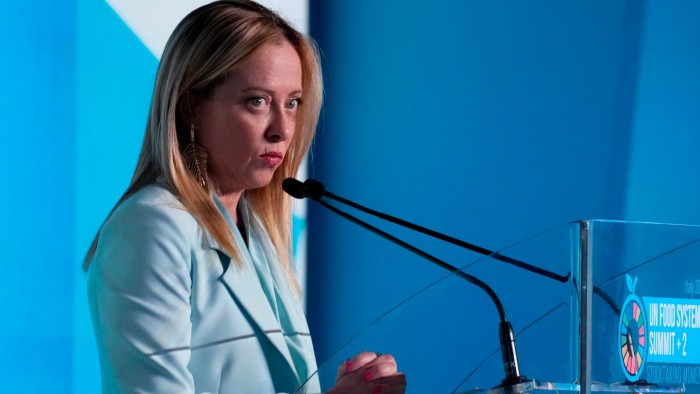Italy harms itself by blocking changes to crisis-fighting in eurozone

Roula Khalaf, Editor of the FT, selects her favourite stories in this weekly newsletter.
The writer is chief economist at German bank LBBW
Much progress has been made to make euro area banks more resilient. The woes affecting US regional banks, not to speak of Credit Suisse, did not infect eurozone lenders. Tighter regulation leading to higher levels of liquidity and capitalisation, while costly for the banks, has contributed to this stability.
Another vital plank propping up confidence in euro area banks is the single resolution mechanism. At the end of this year, the eight-year period will conclude during which banks contributed to the single resolution fund (SRF). The fund will then have amassed ammunition of up to €80bn, which it is to use to support European banks that get into trouble, thus avoiding the politically contentious taxpayer bailouts of the past. In the case of Spain’s Banco Popular, the system has been tested and proved that it functions in practice.
But don’t hold your breath. A critical gap remains in the resolution architecture. The European Stability Mechanism is meant to act as a backstop that could at short notice double the SRF’s firepower. Flexibility to mobilise the ESM’s resources is essential to maintain confidence, in case larger banks are in trouble. But one big obstacle stands in the way of the ESM’s role of supporting the euro area’s banks in times of crisis. This obstacle is called Italy.
Successive Italian governments have refused to ratify the treaty that would allow the ESM’s enhanced role. Recently, prime minister Giorgia Meloni hinted at a trade-off: Italian approval of the ESM treaty in return for more lenient fiscal rules for EU member states. These two issues are entirely unrelated and Rome’s position is nothing short of blackmail.
What irks Italy is an obsessive fear of getting into a situation similar to Greece a decade ago. In Italian politics, the term “ESM” is equivalent to economic pain and austerity. The loss of sovereignty implicit in being bossed around by outsiders about which policy choices the government should embark on seems too much to bear. Maybe the famous 2011 letter by European Central Bank president Jean-Claude Trichet to the late Silvio Berlusconi, then prime minister, still haunts parts of the political class. Trichet was very explicit about the concrete steps the Italian government should take to mitigate the crisis. Shortly thereafter, Berlusconi resigned and was replaced with the technocrat Mario Monti.
Whatever psychological burdens may weigh on Italian politicians, the refusal to ratify the ESM treaty is an irrational act of self-harm. Rather than holding the rest of Europe hostage over the ESM, Italy behaves like someone holding a gun to his own head, shouting that if he doesn’t get what he demands, he will pull the trigger. Italy has one of Europe’s most vulnerable banking systems. The multiyear saga about Monte dei Paschi, the world’s oldest surviving bank, was a potent reminder of the system’s fragility. Italian banks hold an oversized portion of their assets in Italian government bonds. The “doom loop” is alive and kicking. Any sell-off of sovereign bonds would hit the Italian banking system harder than any other in Europe. This makes Rome’s obstinacy baffling.
That said, the rest of Europe must be allowed to move on. The turmoil this spring reminded us that financial crises can and do still occur. Europe must be able to use all the tools at its disposal. If Italy is digging in, the others must act. It is unreasonable that Italy should benefit, possibly more than any other country, from the ECB’s transmission protection instrument, unveiled a year ago. TPI allows Frankfurt to selectively buy government securities of a member state that is coming under unwarranted selling pressure.
The argument has to be the other way around: a financially vulnerable nation such as Italy would not be an innocent victim of evil speculators if it willingly declined protection that might be provided by ESM funding. Italy’s blockage of ESM reform would make it a perpetrator, not a victim. The risk of a run on its government debt or on Italian banks is higher without the ESM than it would be with it. Holding up the treaty’s passage increases the likelihood of a crisis in Italy and makes it unreasonable to call for European solidarity.
The ECB should make clear that TPI is the ultimate answer only if other layers of European support have failed. By blocking the ESM’s involvement as one such layer, Italy would be excluded from benefiting from TPI. Expect the ratification blockage to be lifted swiftly once the ECB sets these incentives. It would be madness for Italy, arguably the euro area’s weakest link, to go it alone. But whatever Rome chooses to do, it must not stand in the way of everyone else willing to protect European taxpayers and to make eurozone banks safer.
Letter in response to this article:
Italian banks no longer conform to old narratives / From Giovanni Sabatini, General Manager, Italian Banking Association, Rome, Italy
Comments